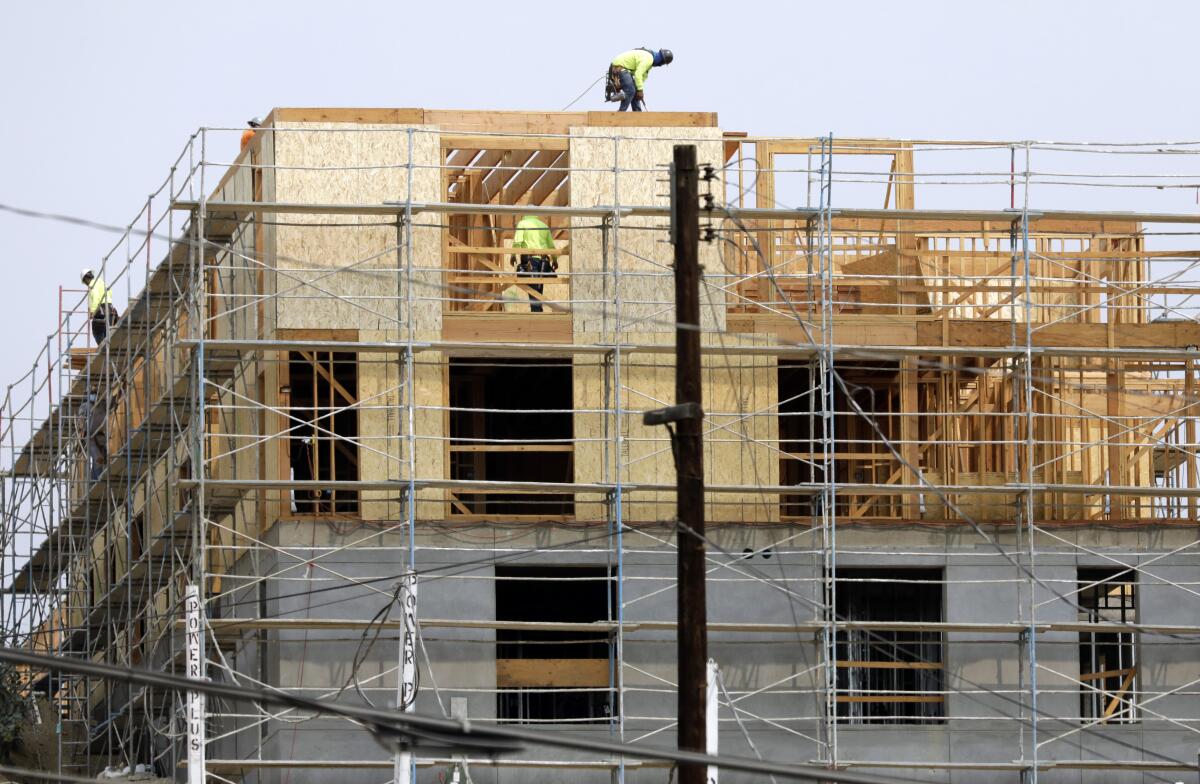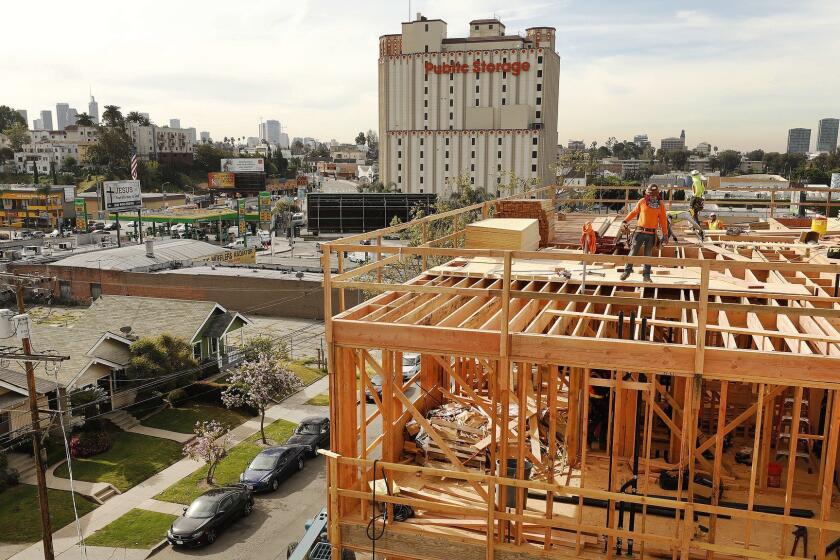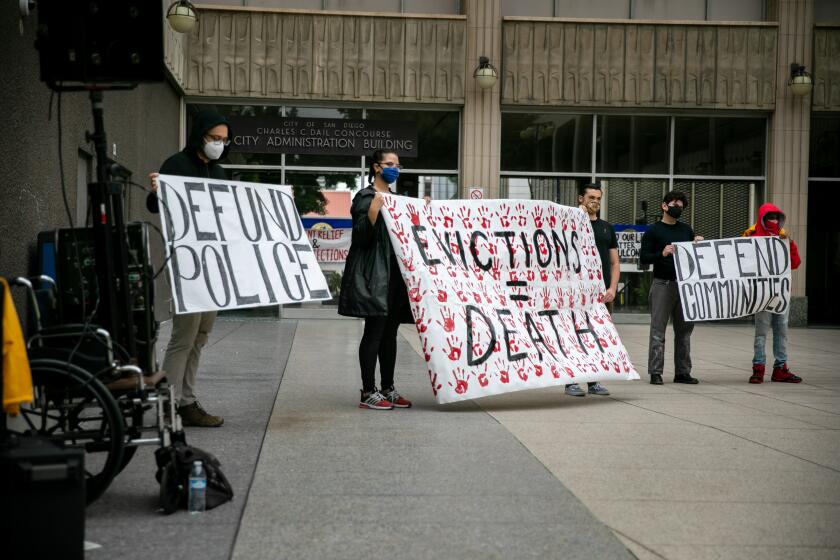Housing costs for the homeless rose to $531,000 a unit, L.A. controller’s report says

- Share via
The average cost of building a single unit of housing for the homeless in Los Angeles has risen to $531,000, according to an audit from the city controller, who recommends that L.A. rehab motels and open dormitory-style buildings to save money and get people off the streets quickly.
Controller Ron Galperin, in a report due Wednesday, also cited two projects whose costs soared to nearly $750,0000 per unit and assailed delays that he said have driven city-funded homeless construction expenses up from initial projections of $350,000 a unit.
Nearly four years after voters approved Proposition HHH, only three projects have opened, construction has not started on three-quarters of the planned units, and many projects may “never come to fruition,” said Galperin, adding that the delays began before the COVID-19 pandemic.
“We can and must do better,” Galperin said in a phone interview Tuesday. His suggestions include interim housing and shelters instead of new construction.
“When you create a very complex model, it requires many levels of funding and approval and puts more and more requirements on what a unit should look like and what features you need, and you end up with an expensive paradigm for building housing,” he said.
Nicholas Halaris, head of the Proposition HHH Citizens Oversight Committee, expects most projects funded by the $1.2-billion bond program to be developed in less than six years, the average time frame for affordable housing.
More than six months after Mayor Eric Garcetti predicted that a new housing project for homeless people would open every three weeks, there has been only one other opening to celebrate. The coronavirus pandemic is one reason for the delay -- but only one.
The mayor’s $120-million housing innovation challenge, which the oversight committee pushed hard to fund with the bond money, is already trying modular construction and other ideas Galperin is championing, and units are coming in at $350,000 a unit, said Halaris, principal at Metros Capital, a West Hollywood-based real estate investment firm.
“The individuals who run these organizations do not have big, bloated corporate infrastructures but are small with entrepreneurial-driven staff that are not in the business of wasting time or money,” Halaris said.
The two projects the controller cited for extremely high costs appear to be outliers.
The price tag on the 49-unit Lorena Plaza on East First Street near Evergreen Cemetery shot up to $746,000 a unit when neighboring El Mercado, a landmark restaurant and shopping complex, sued to stop the project.
Dora Leong Gallo, president and chief executive of developer A Community of Friends, said the group had to add commercial space and design features and build semi-subterranean parking to win acceptance by city officials and community members.
“It took the city two years just to hear the appeal,” she said. The group reached a settlement in the litigation to proceed with the project in January, after four years of strife.
California and the Trump administration issued protections this week that keep many tenants from losing their homes
“Since that time, construction costs have gone up, materials have gone up,” Gallo said.
Summit View Apartments, a 48-unit project for homeless and disabled veterans under construction in Sylmar by L.A. Family Housing, is on a surplus parcel the city turned over, ostensibly to speed construction and eliminate land acquisition costs.
But there’s a reason the property was surplus, according to L.A. Family Housing President and CEO Stephanie Klasky-Gamer: It’s on a steep hillside, 80 feet high, and required extensive grading, waterproofing, concrete work and masonry just to prepare for building.
“They call it ‘The Cliffs,’” said Klasky-Gamer of locals’ name for the long-unused parcel. The city also left the nonprofit to build a sidewalk, curb and gutter, she said.
“We wanted to be a city partner responding to their urgency, and I don’t regret that,” Klasky-Gamer said. “But it was absolutely unfair to us.”
The project is now being built at $739,000 per unit.
Ann Sewill, general manager of the city’s Housing and Community Development Department, said savings from motel conversions, while appealing, are unproved.
“Everyone thinks motels are lower-cost, but there haven’t been that many models going through,” Sewill said. She said the city has opened or developed 30 bridge housing facilities, shelters designed to move homeless people into permanent housing faster. But the permanent units aren’t there, and Proposition HHH is the only source of money to expand the supply, she said.
“That is a key part of our whole homeless plan,” Sewill said.
Critics say other housing options for the homeless are also turning out to be more costly than predicted. In a new court filing, a group suing L.A. city and county over its handling of homelessness praised plans for small houses called “Pallet shelters” but described the operational cost — which they put at $42,000 a bed — as “nothing short of outrageous.”
Mayor Eric Garcetti will continue to work with Galperin on keeping homeless housing costs down, according to spokesman Alex Comisar. But he added that the mayor’s focus remains on permanent housing.
“That’s the kind of housing we know will help us end homelessness,” Comisar said.
More to Read
Sign up for Essential California
The most important California stories and recommendations in your inbox every morning.
You may occasionally receive promotional content from the Los Angeles Times.













